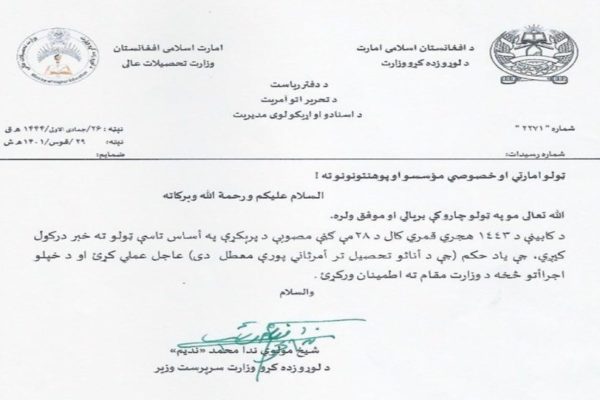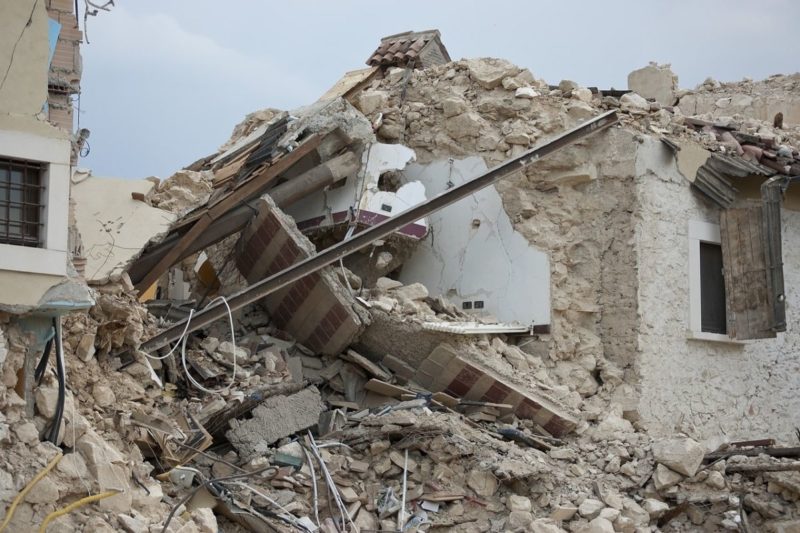The Taliban : men who are afraid of educated women
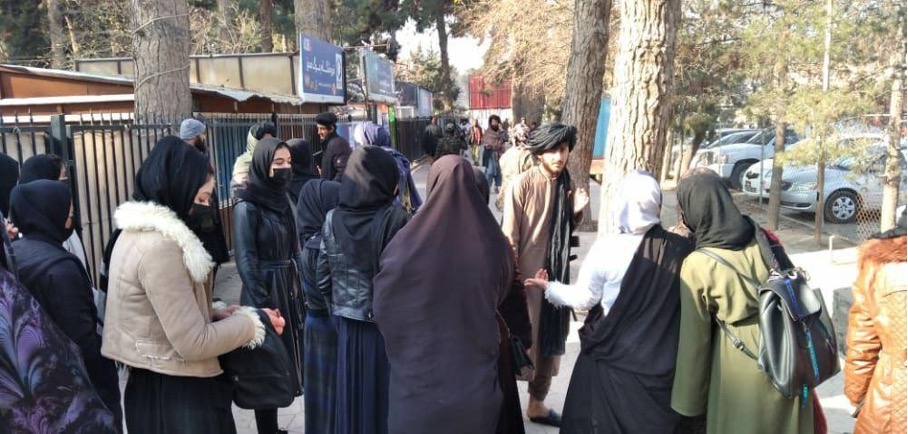
The Taliban have ordered an indefinite ban on university education for women and girls in public and private universities in Afghanistan. By suspending the continuation of girls' education, the Taliban have shown their true face to the world.
In a letter sent to all public and private universities, it is stated that, in accordance with the Taliban cabinet’s decision of 20 December, university education for girls and women is « closed until further notice ».
The letter, signed by Nada Mohammad Nadim, acting head of the Taliban’s Ministry of Higher Education, stresses that universities must implement this order « immediately ».
It considers it contrary to « Afghan zeal and Islam » that girls stay in female student dormitories and go to study in another province without their family members, meaning they travel « without sharia Muharram ».
The failure of female students to wear the full hijab, the mixing of men and women, and the presence of female students in fields « not suitable for women and not conducive to their dignity » are among the main reasons cited by the regime.
Hundreds of women and girls in different parts of Afghanistan are protesting and asking the world to ban the Taliban. They are also demanding the closure of the Taliban office in Qatar and that the funds it receives are stopped.
The issue of girls’ education and constraints on women has been widely raised and severely criticised by international and human rights organisations and has become one of the most controversial topics since the Taliban took power on 15 August 2021.
To protest the Taliban’s decision
Following numerous protests over the ban on women’s education in Afghan universities, the Taliban’s acting minister of higher education said it would remain in place until the issues related to sharia law were resolved. He mentioned, among other things, the situation of women and girls having to wear the hijab, their presence in the same universities as males, and the presence of women in engineering and agriculture faculties.
Most of the female students and activists in Kabul, Tahar, Nangarhar and Herat provinces have decided to protest the Taliban’s decision. Many politicians, diplomats, international organisations such as the UN, EU, and the Organisation of Islamic Cooperation, and countries such as the US, the UK and Japan – as well as Saudi Arabia, Turkey and Iran – have also called for the abolition of the ban.
In November 2022, Taliban officials also banned women from going to public parks, gyms, and the hammam.
Within an hour of the decision to ban girls’ university education being made public, Human Rights Watch called it a « shameful » decision that violates the right to education for women and girls. The Taliban is making it clear every day that it does not respect the human rights of Afghans, especially women.
Meanwhile, Richard Bennett, the UN Special Rapporteur on Afghanistan, also condemned the announcement on Twitter and called on the Taliban to withdraw the decision immediately.
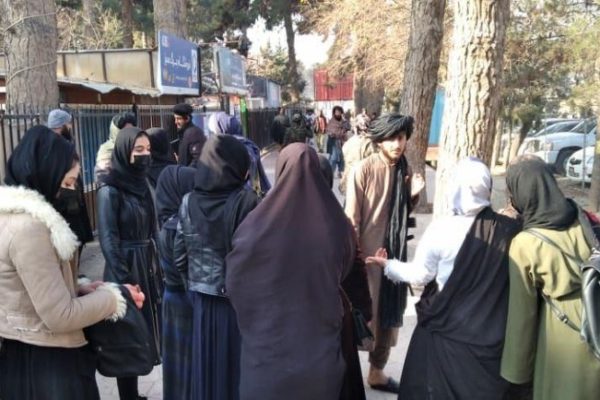
UK Prime Minister Rishi Sunak tweeted: « As a father of two daughters, I cannot imagine a world in which they are denied an education. Afghan women have so much to offer. Denying them access to university is a serious step backwards. The world is watching. We will judge the Taliban by their actions. »
Meanwhile, about 400 students in Kandahar, the birthplace of the Taliban, took to the streets to boycott exams in solidarity with their female peers. More than 40 professors from different Afghan universities resigned to support their female students.
« As a father of two daughters, I cannot imagine a world in which they are denied an education. »
The Taliban’s harsh actions against women and girls have led to strong criticism and vulnerability from domestic, regional and national forces over the isolation of the group’s interim government in international arenas.
The US joined the foreign ministers of Australia, Canada, France, Germany, Italy, Japan, the Netherlands, Norway, Spain, Switzerland, and the UK, as well as the High Representative of the EU, in strongly condemning the Taliban decision as another part if its « relentless and systemic » oppression of women and girls.
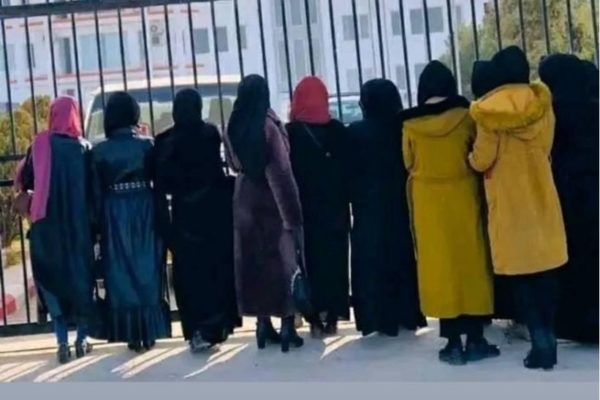
In a statement issued on behalf of the EU, the High Representative and Vice President Josep Borrell said that having taken de facto control of the country, the the Taliban have an obligation to ensure the protection and realisation of social, economic, cultural, civil and political rights protected by international conventions and treaties to which Afghanistan is a party. This includes ensuring that quality education is available and accessible to all, without discrimination.
The other part of this declaration mentions that every child should have access to primary and secondary education without discrimination of any kind, regardless of religion, gender, ethnic or social origin, disability or any other status. Access to higher education must also be ensured without discrimination of any kind.
He added that persecution, based on gender, can constitute a crime against humanity under the Rome Statute, to which Afghanistan is a state party.
« The recent measures taken by the Taliban, in conjunction with all the previous cumulative measures restricting the human rights of women and girls in Afghanistan » are extremely worrying and seem to constitute a systematic policy. The « intentional and severe deprivation of fundamental rights contrary to international law by reason of group or collective identity », « committed as part of a widespread or systematic attack » is defined as a crime against humanity under Article 7 of the Rome Statute.
At the end of the statement, it was emphasised that the denial of the right to education for Afghan women and girls is first and foremost a violation of their rights and undermines their ability to prosper and play a full and meaningful role in society.
Women working in NGOs
In addition, the Taliban is imposing new restrictions on Afghan women workers. Taliban officials have ordered all domestic and foreign non-governmental organisations (NGOs) to suspend the activities of their female employees until further notice.
The decision comes after the Taliban fired women working in government offices when they took control after the collapse of the previous government in 2021.
Rafaëlla Lodice, the EU’s chargée d’affaires in Kabul, said the ban on Afghan women working for national or international NGOs is shocking and has a devastating impact on the delivery of aid to Afghans in need and « especially on our Afghan sisters ».
« Anger, pain, despair, this is what you and we feel today, » she said.
Nabila Massrali, spokesperson for Josep Borrell, said the EU « strongly condemns » the recent Taliban ban on women working in NGOs: « This is a further severe restriction on the ability of Afghan women to exercise their human rights and a clear violation of humanitarian principles. We are currently assessing the impact this will have on our aid. »
« Anger, pain, despair, this is what you and we feel today. »
She added, in a tweet, that depriving women of opportunities based on their gender is not only a violation of human rights and gender equality; it also deprives Afghanistan and its people of the contribution of women and girls to society. The EU expects the Taliban to live up to its obligations and reverse its decision.
Tomas Niklasson, European Union Ambassador to Afghanistan, re-tweeted part of the EU High Representative’s statement. The EU remains committed to the Afghan people and continues to monitor the situation in the country with a view to providing the necessary assistance to the population in the best possible way.
US Secretary of State Antony Blinken said they were deeply concerned that the Taliban’s ban on women providing humanitarian assistance will disrupt vital and much-needed aid to millions of people. Women are at the heart of humanitarian operations around the world. This decision could be devastating for the Afghan people.
And to conclude on this chorus of protest, Rina Amiri, an Afghan-American diplomat and activist who has been the US Special Envoy for Afghan Women, Girls and Human Rights since January 2022, said that this is another cruel and insensitive decision that punishes women and jeopardises the humanitarian aid on which millions of Afghans depend during this difficult winter.
The Taliban is endangering the lives of Afghans and pushing the country further down a perilous path.
Taliban letter about closing universities. © D.R.
